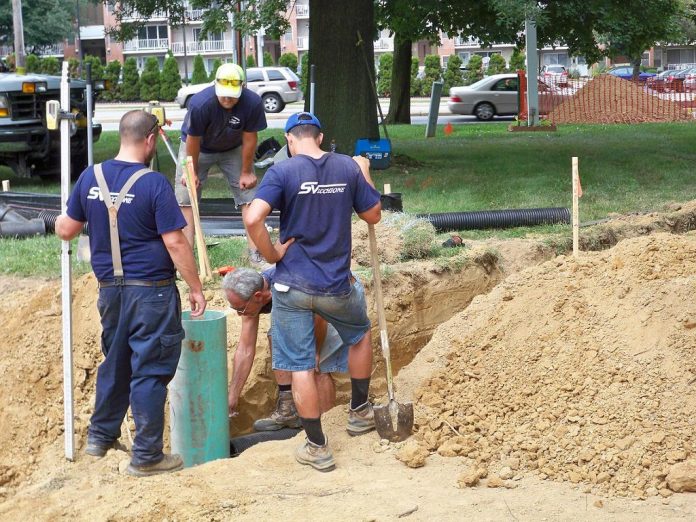Stormwater success: The Bethesda Presbyterian Church celebrates the completion of a new storm garden project. The garden will help with storm water around the property, and also serve as a place of education for local children. PHOTO COURTESY OF BETHESDA PRESBYTERIAN CHURCH
Bethesda Presbyterian Church unveiled Philadelphia’s newest stormwater gardens last Wednesday afternoon, a system of four planted water-retention basins that will allow the Bustleton congregation to reduce its impact on the city’s storm sewers while vastly reducing its water bills.
Bethesda Pastor Ted Ewing joined Philadelphia Presbytery leaders, church members and city officials for the dedication service, which culminated a multi-year project that was supported by a $73,000 grant in 2013 from the city’s Stormwater Management Incentives Program. Bethesda members say that theirs is the first church in the city to undertake and complete such a project.
With about 52,400 square feet of impervious rooftop, parking and driveway area on the church’s 5.27-acre campus at 808 Red Lion Road, the church, like many institutions and commercial organizations, was exposed to a large increase in its annual water bill when the city began implementing a new stormwater management fee schedule five years ago. In short, the Water Department began billing landowners for the stormwater runoff generated by those properties.
The city’s stormwater management strategy also includes incentives to landowners who implement devices to capture and manage stormwater on-site, thereby diverting stormwater from the city sewers. The Water Department’s Green City Clean Waters Plan seeks to convert 9,500 impervious acres into so-called green acres, like Bethesda’s stormwater gardens.
Bethesda’s new gardens — also known as biogardens — are designed to capture the first inch of rainfall during any storm event. Over time, the gardens absorb the water into the ground in a sponge-like manner. In addition to diverting water from the city’s sewer system, the stormwater gardens use natural filtration to improve the quality of stormwater discharged from the property bound for nearby streams.
Contractors broke ground on the Bethesda gardens on June 25. The areas are shallow, planted depressions in the natural landscape that feature dozens of new shrubs and that can soak up to 30 percent more water than a traditional lawn. ••
— William Kenny





